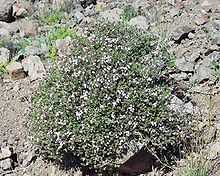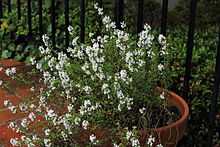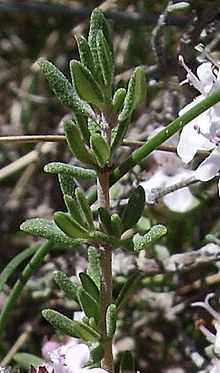Thymus vulgaris
| Thymus vulgaris | |
|---|---|
 | |
| Thyme, Thymus vulgaris | |
| Scientific classification | |
| Kingdom: | Plantae |
| (unranked): | Angiosperms |
| (unranked): | Eudicots |
| (unranked): | Asterids |
| Order: | Lamiales |
| Family: | Lamiaceae |
| Genus: | Thymus |
| Species: | T. vulgaris |
| Binomial name | |
| Thymus vulgaris L. | |

Thymus vulgaris (common thyme, garden thyme or just thyme) is a species of flowering plant in the mint family Lamiaceae, native to southern Europe from the western Mediterranean to southern Italy. Growing to 15–30 cm (6–12 in) tall by 40 cm (16 in) wide, it is a bushy, woody-based evergreen subshrub with small, highly aromatic, grey-green leaves and clusters of purple or pink flowers in early summer.[1]
It is useful in the garden as groundcover, where it can be short-lived, but is easily propagated from cuttings.[1] It is also the main source of thyme as an ingredient in cooking and as an herbal medicine.

Cultivars
Numerous cultivars and hybrids have been developed for ornamental purposes. Nomenclature can be very confusing. [2] French, German and English varieties vary by leaf shape and colour and essential oils. [3] The many cultivars include 'Argenteus' (silver thyme). [4]
The cultivar 'Silver Queen', with white-margined leaves, has gained the Royal Horticultural Society's Award of Garden Merit.[5]
See also
Notes and references
- ↑ 1.0 1.1 RHS A-Z encyclopedia of garden plants. United Kingdom: Dorling Kindersley. 2008. p. 1136. ISBN 1405332964.
- ↑ Totally Thyme
- ↑ Herbs 2000: Thymus vulgaris
- ↑ Thymus argenteus
- ↑ "RHS Plant Selector - Thymus 'Silver Queen'". Retrieved 06 June 2013.
Other sources
- L. H. Bailey; Manual of Cultivated Plants.
- M. Easter; International Thymus Register and Checklist.